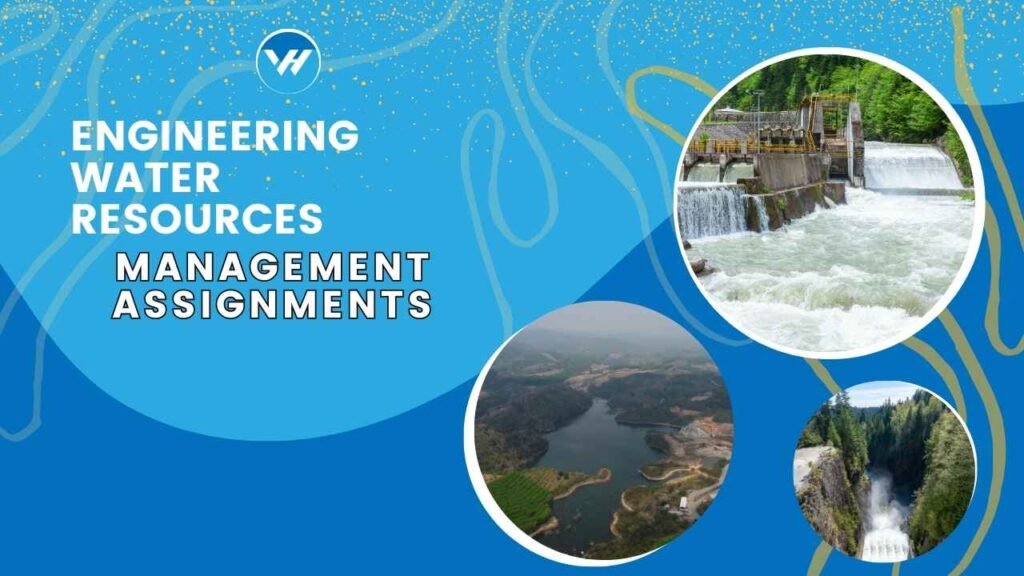Water is the lifeblood of our planet, essential for all forms of life and a critical resource for human civilization. As our global population continues to grow and climate change poses new challenges, the management of water resources has become more crucial than ever. Engineering water resources management assignments play a pivotal role in educating future engineers on how to tackle these challenges effectively. This article will delve into the intricacies of these assignments, providing a comprehensive guide for students to excel in their studies with the help of Virtual Help.

Table of Contents
ToggleUnderstanding Water Resources Management
Water resources management encompasses the planning, development, and management of water resources in a sustainable manner. It involves understanding the hydrological cycle, managing water quality and quantity, and ensuring that water resources are used efficiently and equitably. This field is vital for addressing issues like water scarcity, pollution, and climate change impacts.
Components of Water Resources Management
- Surface Water Management: Involves managing rivers, lakes, and reservoirs to ensure adequate water supply and quality.
- Groundwater Management: Focuses on the sustainable use of groundwater resources, preventing over-extraction and contamination.
- Water Quality Management: Ensures that water is safe for consumption and use, addressing pollution and contamination issues.
- Integrated Water Resources Management (IWRM): A holistic approach that considers the interdependencies of water resources, integrating their management across sectors and regions.
Challenges in Water Resources Management
The field of water resources management faces numerous challenges:
- Climate Change Impact: Altered precipitation patterns and increased frequency of extreme weather events affect water availability and quality.
- Pollution and Contamination: Industrial, agricultural, and domestic activities often lead to water pollution, posing risks to human health and ecosystems.
- Water Scarcity and Overuse: Overuse of water resources leads to depletion, affecting both surface and groundwater supplies.
- Policy and Regulatory Issues: Effective management requires robust policies and regulations, which can be challenging to implement and enforce.
Engineering Approaches to Water Resources Management
- Hydrological Modeling: Used to simulate and predict water cycle components, aiding in planning and decision-making.
- Hydraulic Engineering: Focuses on the design and management of structures like dams, levees, and canals to control water flow.
- Environmental Engineering: Addresses pollution control and the protection of water resources.
- Sustainable Practices: Emphasizes the use of sustainable technologies and practices to ensure long-term water resource availability.
Common Topics in Water Resources Management Assignments
Students may encounter various topics in their assignments:
- Water Cycle and Hydrology: Understanding the movement and distribution of water on Earth.
- Watershed Management: Managing land and water resources within a watershed to maintain water quality and availability.
- Flood Control and Mitigation: Developing strategies to manage and mitigate the impacts of flooding.
- Water Conservation Techniques: Implementing methods to reduce water use and waste.
Importance of Accurate Data and Analysis
Accurate data collection and analysis are fundamental in water resources management. Students must learn how to:
- Data Collection Methods: Use tools like remote sensing, geographic information systems (GIS), and field surveys.
- Tools and Software Used: Employ software such as HEC-RAS, SWAT, and MODFLOW for modeling and analysis.
- Case Studies and Real-World Applications: Apply theoretical knowledge to real-world scenarios, understanding the practical implications of their work.
Role of Virtual Help in Water Resources Management Assignments
Virtual Help is a valuable resource for students tackling complex water resources management assignments. This online platform connects students with expert tutors and provides comprehensive assignment help through its iOS and Android app.
- How Virtual Help Works: Students can find tutors, schedule sessions, and get assistance with their assignments.
- Benefits of Using Virtual Help: Access to expert guidance, time-saving, and improved understanding of complex concepts.
- Success Stories from Students: Many students have successfully improved their grades and understanding with the help of Virtual Help.
Steps to Complete a Water Resources Management Assignment
- Understanding the Assignment Requirements: Carefully read the assignment brief and clarify any doubts.
- Conducting Research and Gathering Data: Use reliable sources to gather data and information.
- Analysis and Interpretation of Data: Analyze the data using appropriate methods and tools.
- Writing and Presenting the Assignment: Structure the assignment logically, presenting findings clearly and concisely.
Tips for Excelling in Water Resources Management Assignments
- Time Management: Plan and allocate sufficient time for each task.
- Critical Thinking and Problem-Solving Skills: Approach problems analytically and creatively.
- Collaboration and Communication: Work effectively with peers and communicate findings clearly.
- Seeking Help When Needed: Don’t hesitate to seek help from tutors or online platforms like Virtual Help.
Common Mistakes to Avoid in Water Resources Management Assignments
- Inaccurate Data Analysis: Ensure data accuracy and validate sources.
- Poorly Structured Reports: Follow a clear structure and format.
- Neglecting Sustainability Aspects: Consider the long-term sustainability of proposed solutions.
- Lack of Proper Citations: Cite all sources correctly to avoid plagiarism.
Resources for Water Resources Management Students
- Textbooks and Online Courses: Utilize academic texts and online learning platforms.
- Professional Organizations and Journals: Stay updated with the latest research and developments.
- Online Platforms and Forums: Engage with communities and forums for support and knowledge sharing.
Future Trends in Water Resources Management
- Technological Innovations: Advancements in data collection, modeling, and analysis tools.
- Policy Changes and Global Initiatives: New policies and international collaborations to address water challenges.
- Emerging Research Areas: Focus on new areas like climate resilience and smart water management systems.
Conclusion
Engineering water resources management assignments are essential for preparing future engineers to address the pressing water challenges of our time. By leveraging resources like Virtual Help, students can enhance their understanding and performance in these assignments. Remember, accurate data, effective analysis, and sustainable solutions are key to successful water resources management.
FAQs
What is the role of hydrological modeling in water resources management? Hydrological modeling helps simulate the water cycle and predict water availability, aiding in planning and decision-making processes.
How can Virtual Help assist with water resources management assignments?
Virtual Help connects students with expert tutors who provide guidance and support, helping them understand complex concepts and complete assignments effectively.
What are some common tools used in water resources management analysis?
Tools like HEC-RAS, SWAT, and MODFLOW are commonly used for hydrological and hydraulic modeling, data analysis, and simulation.
How can students ensure their assignments are environmentally sustainable? Students should consider the long-term impacts of their proposed solutions, prioritize sustainable practices, and ensure their analysis includes environmental considerations.
What are the future trends in water resources management?
Future trends include technological innovations, policy changes, global initiatives, and emerging research areas focusing on climate resilience and smart water management systems.





